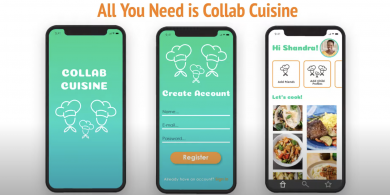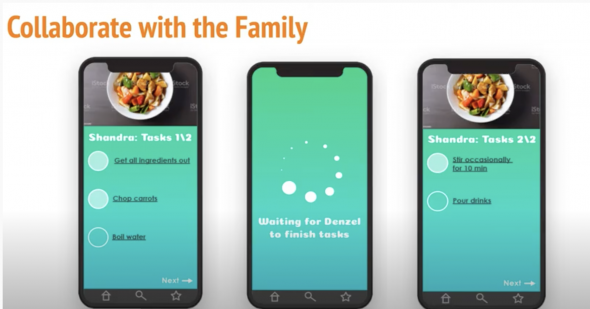Annual Health Tech Jam successfully switches to virtual event
When the third annual UIC Health Tech Jam went virtual, jammers didn’t miss a beat. Fifty students participated in the four-day event and a dozen student-led teams proposed creative solutions using technology to change health care in the community and the world.
The Health Tech Jam inspires innovation and cultivates collaboration in a fast-paced, education-filled team competition. Participants from UIC’s College of Applied Health Sciences, including physical therapy, occupational therapy, biomedical visualization and rehabilitation sciences, plus the bioengineering department, took part in webinars, workshops and the competition.
Competing teams selected from one of three real-world public health concern prompts created with input from Altus Academy, a private middle school serving students from minority groups, low-income households, and challenging neighborhoods and communities.

Teams collaborated virtually then pitched their final idea in a video presentation to a team of judges. The first place Innovation Award winner Collab Cuisine proposed an app designed to help families make meals that are healthy, delicious, economical and fun to prepare.
“The first night of Tech Jam our team brainstormed hard, we all tossed ideas around knowing we wanted to have family collaboration through an app and the idea grew from there,” said Olivia De Kok, a graduate student in biomedical visualization and member of the winning team. Her teammates included Zach Cooper, Sarah Madsen and Sucel Escalante.
The team behind Collab Cuisine chose the nutrition and convenience prompt. This challenge sought to answer: “Is there anything that could help my family get better eating habits without being so expensive or time-consuming?” The test family was a couple with two children living on $30,000 a year, with a nearby grocery store, but no time to prepare full healthy meals. The family relied on fast food for convenience and lacked motivation to cook expensive healthy meals. The family had smartphones and were app-savvy.

The Collab Cuisine concept app was based on the idea that collaboration would lead to shorter cooking time, benefits for kids, and higher nutrition for the family. The app would include a list of recipes searchable by ingredient, cooking time and cost per recipe. The app would also track food budgets and compare the users’ spending with the national average. To foster collaboration, the app would allow for assigning each family member a level from 1, for ages 3 and under, to 5 for ages 13 and up. Meal tasks are would be divided equally among family members, based on member’s skill levels. Videos show cooking techniques and tutorials.
Two projects tied for the Health Tech Jam’s People’s Choice Award: (selected by the participants of the event by vote) Common Threads, an app designed to bridge the gap between inactivity and mobility, and Around the Block, an app game that blends mental and physical health with nutrition and physical activity.
De Kok was encouraged to participate in the Jam by her academic advisor, Samantha Bond, an assistant clinical professor of biomedical and health information sciences.
“I really didn’t know what I was signing up for, but I really enjoyed it. All the speakers were amazing. And all teammates were fantastic. It was and cool to meet other people from the college. That’s not an opportunity you typically get,” De Kok said.
“The Health Tech Jam has always been about two things — technological innovation and meaningful collaboration. We want students to be able to come up with ideas for technology that are grounded in real community needs, but we also want to give them the unique experience of working with people from a variety of backgrounds,” Bond said. “Going virtual gave us the opportunity to bring these goals into a space where technology in healthcare has never been more relevant.”
